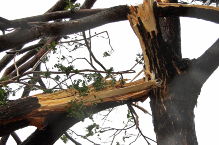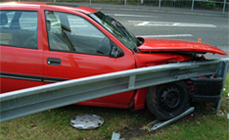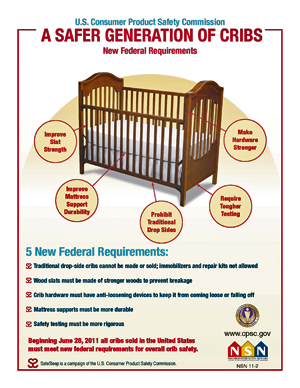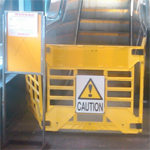Wrongful Death
Massachusetts Safety Tips After Tropical Storm Irene
 Now that Tropical Storm Irene has passed, residents and businesses throughout Massachusetts have started the extensive clean-up. Many remain without power.
Now that Tropical Storm Irene has passed, residents and businesses throughout Massachusetts have started the extensive clean-up. Many remain without power.
An estimated 4.5 million homes and businesses along the East Coast lost power, including 700,000 in Massachusetts, officials reported. Utility and state officials estimate it may take several days to restore power in some communities.
The storm caused 26 deaths across the country. In Massachusetts, a public works employee on his way to join recovery efforts was electrocuted Monday by a downed power line outside his Southbridge home.
From Storrow Drive in Boston to Interstate 91 in western Massachusetts, many roads were shut down by flooding. Residents in several communities were evacuated from their homes, including in several western Massachusetts towns, Southboro and New Bedford,
Whether you are cleaning up your yard, driving or waiting for power to be restored, it is essential to think safety for you, your family and property. Here are safety tips from the Boston personal injury lawyers at Breakstone, White & Gluck:
- Be prepared for intersections without working traffic lights or police officers to direct cars.
- When driving, travel farther behind the vehicle in front of you than normal. Road detours and single-lane roads may not be visible until just before you reach them.
- Give even more room when traveling behind tractor trailers carrying heavy loads of branches and storm debris.
- If your home is still without power, make sure you have enough flashlights and plenty of extra batteries. Avoid using candles.
- Natural gas or propane valves that have been under water should be replaced. Smell and listen for leaky gas connections that may trigger an explosion.
- If you believe there has been a gas leak, there is risk for a home explosion. Immediately leave the house, leave the doors open and contact a gas system professional before you return.
- Take measures to avoid food poisoning. Throw away any refrigerated foods that are held at above 40 degrees for more than two hours. Food can generally keep for up to 4 hours in a refrigerator that is not opened and between 24 to 48 hours in a freezer.
- Watch news reports to see if your local health department has cleared tap water for safe consumption. If you are without power and cannot watch television or access the Internet, call your town or city hall to ask.
- Watch out for and stay away from downed power lines.
- Do not enter and avoid walking near damaged buildings.
- Be careful walking under trees as there may be loose branches.
Drive Safe in August as Motor Vehicle Accidents Rise
 You may think winter snowfall makes for treacherous driving. But government figures show August is actually the most dangerous month on the roads, making it an important time to take precautions.
You may think winter snowfall makes for treacherous driving. But government figures show August is actually the most dangerous month on the roads, making it an important time to take precautions.
Based on records dating back to 1994, the National Highway Traffic Safety Administration (NHTSA) reports more Americans die in car crashes in August than at any other time of the year. In August 2009, that number totaled 2,864 deaths.
September had the next highest rate of traffic fatalities, followed by July. Weekends are the deadliest time on the roads throughout the year. Nationwide in 2009, there were an average of 123 deaths each day on Saturdays and 107 deaths on Sunday.
Experts say motor vehicle deaths rise in August because more people are on the road traveling for vacation, taking day trips and attending summer events.
Because of these factors, it is paramount to practice safe driving. Here, our Massachusetts personal injury lawyers offer safety tips to protect you and your family:
- Do not drink and drive.
- Travel slowly at night and make sure you are familiar with your route.
- Reduce distractions by putting away your cell phone and GPS.
- When traveling with children, explain you must concentrate on the road.
- On the highway, make sure children have distractions such as books and games.
- Never leave a child unattended in a vehicle.
- Wear your seat belt.
- Do not speed.
- Talk to teenagers about taking safety precautions such as limiting passengers and avoiding night driving.
New Crib Safety Standards Ban Sales of Drop-Sides
 The Consumer Product Safety Commission (CPSC) has implemented comprehensive new safety standards for baby cribs. The standards ban the sale of dangerous drop-side cribs and improve safety testing to prevent infant strangulation deaths.
The Consumer Product Safety Commission (CPSC) has implemented comprehensive new safety standards for baby cribs. The standards ban the sale of dangerous drop-side cribs and improve safety testing to prevent infant strangulation deaths.
The regulations took effect this week after the recall of over 11 million unsafe cribs since 2007. Over the past decade, at least 32 infants have suffered suffocation and strangulation deaths in defective baby cribs.
The CPSC is calling the new regulations the “most stringent crib safety standards in the world.” The standards are important for parents to learn because the CPSC reports that even cribs without drop-sides are unlikely to meet the new standards.
The standards work to prevent infant deaths in several ways. In addition to banning the manufacturing or sale of drop-side cribs, the standards strengthen mattress supports and crib slats, make testing more rigorous and require crib hardware to have anti-loosening devices.
All importers, distributors, manufacturers and retailers must comply with the regulation immediately. Many large retailers such as Target and Walmart say they have already stopped selling drop-side cribs.
Certain businesses using cribs have a grace period for compliance: in-home child care services, child care facilities, rental companies and public accommodations such as hotels.
The CPSC said parents who want to keep using drop-side cribs can contact their manufacturer and ask if they offer an immobilizer. These devices secure drop-sides to prevent the crib from separating and causing an infant injury.
Parents with other types of cribs are urged to check their cribs as well. One of the reasons other cribs are unlikely to comply is the new standards require stronger wood and other materials. Parents who continue to use their existing cribs are urged to monitor recalls on the CPSC website at www.cpsc.gov.
Read More
Workers’ Memorial Day in Massachusetts Remembers Workplace Victims
Every year, Massachusetts families and organizations come together to honor the men and women who are killed and injured while on the job. This year, on April 28, the Massachusetts Coalition for Occupational Safety and Health (MassCOSH), the Massachusetts AFL-CIO, and the Greater Boston Labor Council are co-sponsoring Workers’ Memorial Day and are publishing the 2011 report: Dying for Work in Massachusetts: Loss of Life and Limb in Massachusetts Workplaces.
“It is critical that Massachusetts employers improve the safety of their workplaces to protect their workers. The high rate of death and injury on the jobsite is still taking a horrible toll on Massachusetts workers and their families. It is also unfortunate that enforcement continues to suffer budget cuts,” said Boston personal injury lawyer David White.
As stated in this sobering report, its purpose is to “highlight the fact that work continues to kill and maim workers in epidemic and alarming numbers. The saddest aspect to this loss in lives and limbs is that work-related injuries and illness are preventable.”
The report describes in clear detail the tragedy facing Massachusetts workers and their families. In 2010 alone, 47 Massachusetts workers lost their lives while on the job. (Breakstone, White and Gluck has the privilege and honor of representing the family of one of these deceased workers in their claim for his pain and suffering and wrongful death while on the job.)
The top three causes of fatalities among Massachusetts workers in 2010 were transportation (12 deaths: drivers or workers on roads involved in motor vehicle accidents and plane/helicopter crashes), falls (9 deaths: half being construction site accidents), and commercial fishing (4 deaths).
On Workers’ Memorial Day, we honor the fallen by demanding stronger workplace health and safety protections under the Occupational Health & Safety Administration, because it is every person’s right to be safe in their own work environment.
Join us on Thursday April 28, 2011 from 12:15 to 1:15 p.m. outside the Massachusetts State House as we mourn for the dead and fight for the living.
Breakstone, White & Gluck is a proud sponsorof MassCOSH, an organization with a great reputation for protecting workers and improving workplace safety.
Massachusetts Escalator Accident Follows Years of State’s Failure to Inspect
 A recent public records request made by the Boston Globe shows the state has failed to regularly inspect approximately 75 percent of the escalators in Massachusetts malls.
A recent public records request made by the Boston Globe shows the state has failed to regularly inspect approximately 75 percent of the escalators in Massachusetts malls.
From 2008 to 2010, only 44 of the state’s 188 mall escalators received annual inspections as required by law. Inspectors missed one or two inspections during those three years on 144 escalators.
When mall escalators were inspected, they needed repairs in more than half the cases. Mall escalators were shut down 22 times.
The newspaper made the public records request following the wrongful death of 4-year-old Mark DiBona last month in an escalator accident in a Sears department store at the Auburn Mall near Worcester. The child fell through a 6-inch-wide gap between the handrail and the glass barrier.
The state Department of Public Safety suspended the two inspectors who approved the defective escalator for use.
The state’s failure to inspect its escalators dates back at least 15 years. In 1995, the Globe reported that nearly 40 percent of the state’s escalators and elevators had expired inspections.
The state currently has 34,000 elevators and 900 escalators for 51 inspectors to examine. Two dozen of those positions were created in 2010, the same year an audit found that nearly a third of the state’s elevators and escalators had expired inspections. Fifty one inspectors is the most the state has had in years, though some specialists say they still carry a heavy workload.
Beyond staffing, some specialists in the field say that inspectors spend more time on elevators and are less experienced with escalators, which may contribute to escalator accidents in Massachusetts.
Boston personal injury lawyer David White on the findings: “It is encouraging that the state is now catching up on the backlog of inspections. What is discouraging, however, is how many violations they are finding. This is a strong indication that property owners and their own service companies may be putting the public at severe risk.”
To read the Boston Globe article reporting this data, click here.
Read More
Window Blind Design Reconsidered After Numerous Infant Deaths
The Consumer Product Safety Commission (CPSC) has asked manufacturers to re-design window blinds so as to eliminate the risk of infant wrongful death from strangulation.
Window blind manufacturers have known about the problem for decades, starting with a federal study in the 1980s that tied 41 child strangulation deaths to drapery and blind cords. Since then, manufacturers have dragged their feet when it comes to improving safety.
And infants are still dying. The NY Times reports that in August 2009, Kathleen Leeson put her 2-year-old son down for a nap. A short time later, Ms. Leeson discovered her son hanging, lifeless, an inch off the floor with the window blind cord wrapped around his neck. Further, in 2002 1-year-old Cheyenne Kaiser was found by her mother strangled sitting up in her crib, which was next to the window, with the inner window blind cord wrapped around her neck.
The CPSC has released a safety alert for concerned parents explaining the risk of personal injury and wrongful death to children from the various types of window blind cords. In its safety alert, the CPSC makes four recommendations to help prevent these tragic strangulation injuries:
- Use only cordless window blinds in all homes where children live or visit;
- Do not place cribs, beds, or furniture close to windows where children can climb and gain access to the cords;
- Make all loose cords inaccessible; and
- In windows with looped bead chains or nylon cords, use tension devices to keep the cord taut.
Moreover, in response to the industry’s unenthusiastic attempts at improving product safety, a task force of regulators, consumer advocates, and industry leaders have come together to find a solution by the fall of 2011.
The CPSC has also warned the window blind industry that, if it cannot reach a solution soon to minimize these life-threatening dangers, it may face mandatory safety regulations.
Salmonella Outbreak in Rhode Island Now Linked to Death
A salmonella outbreak in Rhode Island now includes at least twenty-one people with severe illness, and one death, according to reports from public health officials in that state. Health officials are investigating another eighteen illnesses to see if they are tied to the salmonella outbreak.
Officials are focused on zeppole and other pastries which were made by Defusco’s bakery in Johnston, Rhode Island. According to news reports, investigators found pastry shells stored in boxes contaminated with raw eggs, and also found that custard used as filling was not being properly chilled.
Investigators have identified the particular strain of salmonella, known as Salmonella heidelberg, as the suspected organism responsible for the illnesses. They are now trying to determine whether the death of the elderly Rhode Island resident was caused by that particular strain.
The investigation into the food poisoning outbreak began on March 25, 2011, after nearly a dozen elderly residents of a Warwick nursing home became sick after eating pastries from Defusco’s bakery. Since March 12, two dozen victims have required hospitalization for severe illness.
Salmonellosis, the disease caused by salmonella infection or salmonella toxins, leads to diarrhea, fever, vomiting and abdominal cramps. Most people recover without treatment, but in the elderly, in infants, or people with compromised immune systems, the disease can be very severe, requiring hospital admission for rehydration and antibiotic treatment to prevent the spread of infection. Severe infections can lead to reactive arthritis and death.
Prevention of salmonella illnesses is straightforward. Food which may contain the bacteria, such as chicken or pork, must be prepared properly to kill the organism and destroy any salmonella toxin. Eggs and milk, and their products, must be properly prepared, handled, and refrigerated. Infections can also occur from contact with reptiles, pet rodents, and tainted fruits and vegetables. Proper hygiene–washing hands before and after handling food–is also a common sense method of reducing the likelihood of food poisoning.
Each year over 140,000 people suffer from salmonella poisoning in the U.S. and dozens die from the illness.
State Investigation Reveals Unodorized Propane Tanks in Fatal Norfolk Explosion
According to the recently released report of the Massachusetts State Fire Marshal, the Norfolk condominium explosion that killed an electrician in July 2010 was caused by a leak of unodorized propane gas. Breakstone, White & Gluck represents the late electrician’s family.
William Nichols, a 46-year-old electrician from Blackstone, was one of the workers in the condominium at The Village at River’s Edge when it exploded on July 30. He was buried under burning debris for more than ninety minutes before he was pulled alive and conscious from the wreckage. Mr. Nichols died that evening at Brigham & Women’s Hospital in Boston from his massive injuries. Seven other people were injured in the blast.
State investigators called this a case of “odorant fade,” which results from underfilling of a new propane tank. Industry safety standards specify tanks should be filled 80 percent. EnergyUSA of Taunton only put 200 gallons in the tank providing propane to the condominium.
Workers at the scene had no warning there was a propane leak. The leaking gas contained no ethyl mercaptan, a strong odorant which is added to propane to allow for its detection. Without this additive, propane is odorless and undetectable.
Boston attorney Marc Breakstone, who represents the Nichols family, stated that ‘these reports describe in painful detail the danger of a leak of unodorized propane gas into the environment. This was a tragedy which could have been prevented if industry safety standards had been followed.”
Read the state report on the explosion.
News coverage:
- The Boston Globe
- The Boston Channel
- Fox 25 Boston
- The Milford Daily News
- Sun Chronicle
Propane Distributor Linked to More Odorless Propane
A new state report shows DCP Midstream, which distributed the unodorized propane that caused a deadly Norfolk condo explosion, also shipped dangerous propane to four gas facilities serving Massachusetts consumers.
The report was released by Attorney General Martha Coakley and State Fire Marshal Stephen Coan last week. It found DCP Midstream distributed under-odorized propane to four sites associated with Heritage Propane in Sandwich and Martha’s Vineyard. DCP Midstream also had unodorized propane in five railcars at its Westfield facility. Federal and state laws require propane to have an additive known as mercaptan, which emits a strong odor.
The report was prepared this fall by an independent propane expert. Prior to the investigation, state investigators had found six other distributors in Massachusetts received deficient propane.
On July 13, a 48-year-old electrician was killed in a condominium explosion at The Village at River’s Edge in Norfolk, Massachusetts. The complex had received unodorized propane distributed by DCP Midstream. There was a propane leak, but none of the workers at the scene that day were able to smell propane.
“We applaud the swift investigation by the Attorney General’s office, and the findings of the Independent Examiner,” said Marc Breakstone, the attorney for the electrician’s family. “But this report does not answer the question of how odorless gas ended up in the environment at the explosion site. Only time and extensive discovery will reveal the truth about how this catastrophic explosion occurred.”
State officials say the affected companies have all addressed the deficient propane. Independent testing will continue at DCP Midstream’s facility for two years.
DCP Midstream began distributing the dangerous propane in Massachusetts in May 2010. The propane originated with Aux Sable Liquid Products of Illinois.
Product Safety Recall: Baby Tents Pose Strangulation Risk
Just weeks after a massive children’s crib recall, a portable playard tent linked to a young boy’s fatal strangulation has been pulled for safety.
The U.S. Consumer Product Safety Commission (CPSC) and Health Canada, in cooperation with Tots in Mind Inc. of Salem, New Hampshire, has announced the voluntary recall of 20,000 Cozy Indoor Outdoor Portable Playard Tents Plus Cabana Kits. An additional 85 tents were recalled in Canada.
The tent is a white dome-shaped covering designed to fit over playards that contain a child. In December 2008, a two-year-old boy from Vinalhaven, Maine died when he climbed out of the playard. He was found hanging with his neck entrapped between the playard frame and the metal base rod of the tent. In this case, the tent had been tied to the playard with pieces of nylon rope and partially attached with the tent’s clips because the child knew how to remove the clips.
In three other incidents, children removed the clips on the tent and were able to place their necks between the tent and the playard. The children were not injured.
The unsafe cribs were made in China and sold at Walmart, Amazon and various baby stores from January 2005 to February 2010.
Consumers should immediately stop using the playard tents. They can contact Tots in Mind to get free replacement clips. Replacement clips will be available in late August or early September.
This is the second major product safety recall affecting parents and children in recent weeks. In June, the CPSC recalled two million cribs because of an unsafe drop-side rail, which created a gap where a baby’s head could become trapped. Government officials say this could lead to suffocation or strangulation.
The companies involved in the recall include Evenflow, Delta Enterprises Corp., Child Craft, Jardine Enterprises, LaJobi, Million Dollar Baby and Simmons Juvenile Products Inc.
Read More


